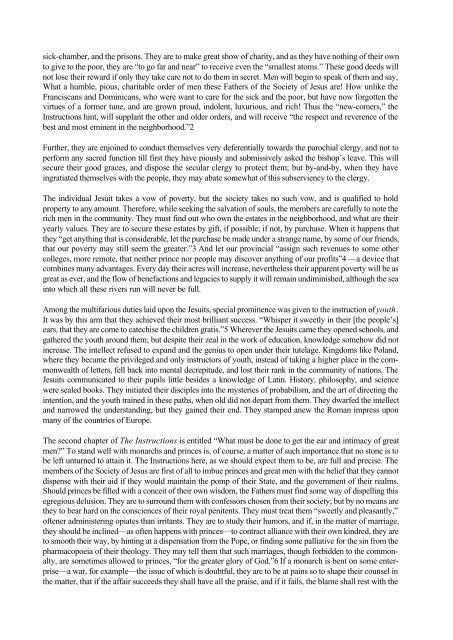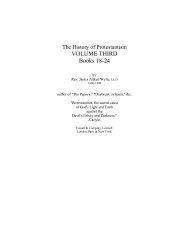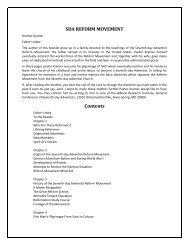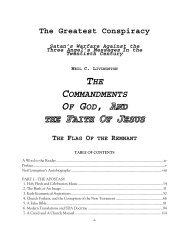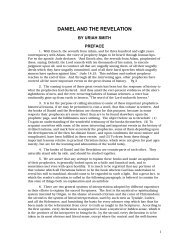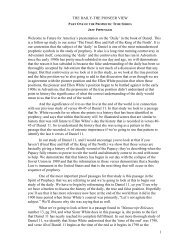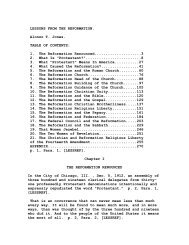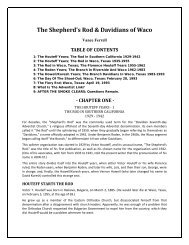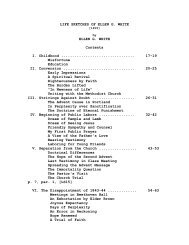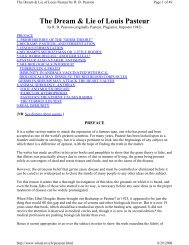History of Jesuits
History of Jesuits
History of Jesuits
Create successful ePaper yourself
Turn your PDF publications into a flip-book with our unique Google optimized e-Paper software.
sick-chamber, and the prisons. They are to make great show <strong>of</strong> charity, and as they have nothing <strong>of</strong> their own<br />
to give to the poor, they are “to go far and near” to receive even the “smallest atoms.” These good deeds will<br />
not lose their reward if only they take care not to do them in secret. Men will begin to speak <strong>of</strong> them and say,<br />
What a humble, pious, charitable order <strong>of</strong> men these Fathers <strong>of</strong> the Society <strong>of</strong> Jesus are! How unlike the<br />
Franciscans and Dominicans, who were want to care for the sick and the poor, but have now forgotten the<br />
virtues <strong>of</strong> a former tune, and are grown proud, indolent, luxurious, and rich! Thus the “new-comers,” the<br />
Instructions hint, will supplant the other and older orders, and will receive “the respect and reverence <strong>of</strong> the<br />
best and most eminent in the neighborhood.”2<br />
Further, they are enjoined to conduct themselves very deferentially towards the parochial clergy, and not to<br />
perform any sacred function till first they have piously and submissively asked the bishop’s leave. This will<br />
secure their good graces, and dispose the secular clergy to protect them; but by-and-by, when they have<br />
ingratiated themselves with the people, they may abate somewhat <strong>of</strong> this subserviency to the clergy.<br />
The individual Jesuit takes a vow <strong>of</strong> poverty, but the society takes no such vow, and is qualified to hold<br />
property to any amount. Therefore, while seeking the salvation <strong>of</strong> souls, the members are carefully to note the<br />
rich men in the community. They must find out who own the estates in the neighborhood, and what are their<br />
yearly values. They are to secure these estates by gift, if possible; if not, by purchase. When it happens that<br />
they “get anything that is considerable, let the purchase be made under a strange name, by some <strong>of</strong> our friends,<br />
that our poverty may still seem the greater.”3 And let our provincial “assign such revenues to some other<br />
colleges, more remote, that neither prince nor people may discover anything <strong>of</strong> our pr<strong>of</strong>its”4 —a device that<br />
combines many advantages. Every day their acres will increase, nevertheless their apparent poverty will be as<br />
great as ever, and the flow <strong>of</strong> benefactions and legacies to supply it will remain undiminished, although the sea<br />
into which all these rivers run will never be full.<br />
Among the multifarious duties laid upon the <strong>Jesuits</strong>, special prominence was given to the instruction <strong>of</strong> youth.<br />
It was by this arm that they achieved their most brilliant success. “Whisper it sweetly in their [the people’s]<br />
ears, that they are come to catechise the children gratis.”5 Wherever the <strong>Jesuits</strong> came they opened schools, and<br />
gathered the youth around them; but despite their zeal in the work <strong>of</strong> education, knowledge somehow did not<br />
increase. The intellect refused to expand and the genius to open under their tutelage. Kingdoms like Poland,<br />
where they became the privileged and only instructors <strong>of</strong> youth, instead <strong>of</strong> taking a higher place in the commonwealth<br />
<strong>of</strong> letters, fell back into mental decrepitude, and lost their rank in the community <strong>of</strong> nations. The<br />
<strong>Jesuits</strong> communicated to their pupils little besides a knowledge <strong>of</strong> Latin. <strong>History</strong>, philosophy, and science<br />
were sealed books. They initiated their disciples into the mysteries <strong>of</strong> probabilism, and the art <strong>of</strong> directing the<br />
intention, and the youth trained in these paths, when old did not depart from them. They dwarfed the intellect<br />
and narrowed the understanding, but they gained their end. They stamped anew the Roman impress upon<br />
many <strong>of</strong> the countries <strong>of</strong> Europe.<br />
The second chapter <strong>of</strong> The Instructions is entitled “What must be done to get the ear and intimacy <strong>of</strong> great<br />
men?” To stand well with monarchs and princes is, <strong>of</strong> course, a matter <strong>of</strong> such importance that no stone is to<br />
be left unturned to attain it. The Instructions here, as we should expect them to be, are full and precise. The<br />
members <strong>of</strong> the Society <strong>of</strong> Jesus are first <strong>of</strong> all to imbue princes and great men with the belief that they cannot<br />
dispense with their aid if they would maintain the pomp <strong>of</strong> their State, and the government <strong>of</strong> their realms.<br />
Should princes be filled with a conceit <strong>of</strong> their own wisdom, the Fathers must find some way <strong>of</strong> dispelling this<br />
egregious delusion. They are to surround them with confessors chosen from their society; but by no means are<br />
they to bear hard on the consciences <strong>of</strong> their royal penitents. They must treat them “sweetly and pleasantly,”<br />
<strong>of</strong>tener administering opiates than irritants. They are to study their humors, and if, in the matter <strong>of</strong> marriage,<br />
they should be inclined—as <strong>of</strong>ten happens with princes—to contract alliance with their own kindred, they are<br />
to smooth their way, by hinting at a dispensation from the Pope, or finding some palliative for the sin from the<br />
pharmacopoeia <strong>of</strong> their theology. They may tell them that such marriages, though forbidden to the commonalty,<br />
are sometimes allowed to princes, “for the greater glory <strong>of</strong> God.”6 If a monarch is bent on some enterprise—a<br />
war, for example—the issue <strong>of</strong> which is doubtful, they are to be at pains so to shape their counsel in<br />
the matter, that if the affair succeeds they shall have all the praise, and if it fails, the blame shall rest with the


